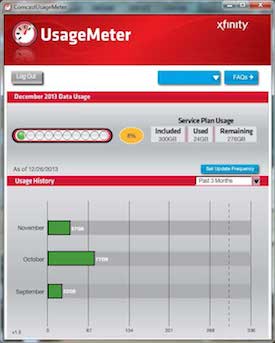
Pay on the way in and pay on the way out.
Comcast’s chief staff lobbyist – executive vice president David Cohen – spoke at an investment conference today, covering a wide range of topics, including an update on usage-based pricing experiments in a handful of markets. He said that Comcast is looking for a way to bill subscribers for monthly downloads over a certain amount, without making them mad or driving them to competitors.
So far, it’s working, according to Cohen, setting an expectation that Comcast will do it nationwide. He then pulled a common lobbyist’s trick: float an unpopular idea – putting all Internet usage on a pay-per-byte, metered basis – then expressing a personal opinion it won’t happen. By doing that, he calms objections by leading people to think it’s a dead issue, but leaving the door wide open to doing it later and then claiming that Comcast had been warning about it for years…
I would also predict that the vast majority of our customers would never be caught in the buying the additional buckets of usage, that we will always want to say the basic level of usage at a sufficiently high level that the vast majority of our customers are not implicated by the usage-based billing plan. And that number may be 350 – that may be 350 gig a month today, it might be 500 gig a month in five years, but it will never – I don’t think we will want to be in a model where it is fully variablized and 80% of our customers are implicated by usage-based billing and are all buying different packets of usage.
I don’t think that’s the model that we are heading toward but five years ago I don’t know that I would have heard of something called an iPad. So very difficult to make predictions.
Cohen also drew a line between companies that feed content into the Internet and consumers who buy access to it, arguing it’s two separate markets and therefore completely appropriate for Comcast to charge for both. Needless to say, he had kind words for FCC chairman Tom Wheeler’s tentative plan to allow ISPs to sort content into fast and slow lanes based on who’s paying whom.
